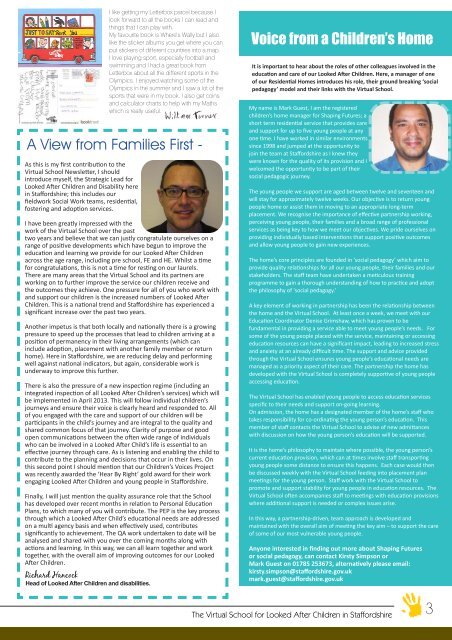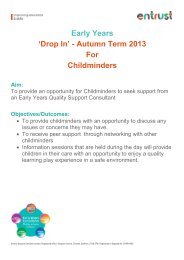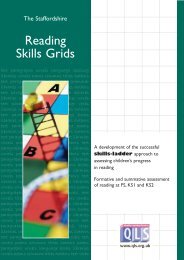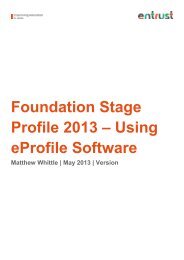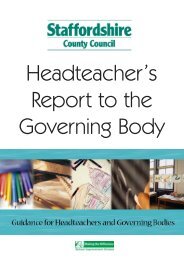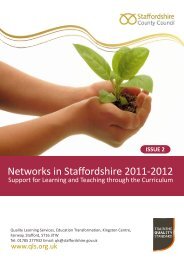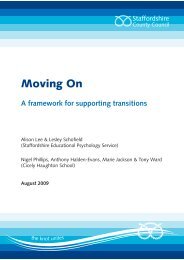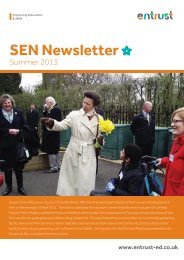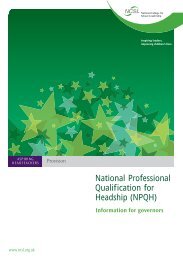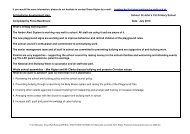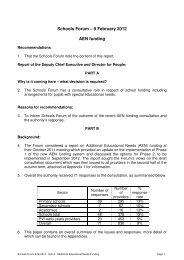Virtual Sch newsletter Autumn 12_PDF version - Staffordshire ...
Virtual Sch newsletter Autumn 12_PDF version - Staffordshire ...
Virtual Sch newsletter Autumn 12_PDF version - Staffordshire ...
Create successful ePaper yourself
Turn your PDF publications into a flip-book with our unique Google optimized e-Paper software.
As this is my first contribution to the<br />
<strong>Virtual</strong> <strong>Sch</strong>ool Newsletter, I should<br />
introduce myself, the Strategic Lead for<br />
Looked After Children and Disability here<br />
in <strong>Staffordshire</strong>; this includes our<br />
fieldwork Social Work teams, residential,<br />
fostering and adoption services.<br />
I like getting my Letterbox parcel because I<br />
look forward to all the books I can read and<br />
things that I can play with.<br />
My favourite book is Where’s Wally but I also<br />
like the sticker albums you get where you can<br />
put stickers of different countries into a map.<br />
I love playing sport, especially football and<br />
swimming and I had a great book from<br />
Letterbox about all the different sports in the<br />
Olympics. I enjoyed watching some of the<br />
Olympics in the summer and I saw a lot of the<br />
sports that were in my book. I also get coins<br />
and calculator charts to help with my Maths<br />
which is really useful.<br />
A View from Families First -<br />
I have been greatly impressed with the<br />
work of the <strong>Virtual</strong> <strong>Sch</strong>ool over the past<br />
two years and believe that we can justly congratulate ourselves on a<br />
range of positive developments which have begun to improve the<br />
education and learning we provide for our Looked After Children<br />
across the age range, including pre school, FE and HE. Whilst a time<br />
for congratulations, this is not a time for resting on our laurels.<br />
There are many areas that the <strong>Virtual</strong> <strong>Sch</strong>ool and its partners are<br />
working on to further improve the service our children receive and<br />
the outcomes they achieve. One pressure for all of you who work with<br />
and support our children is the increased numbers of Looked After<br />
Children. This is a national trend and <strong>Staffordshire</strong> has experienced a<br />
significant increase over the past two years.<br />
Another impetus is that both locally and nationally there is a growing<br />
pressure to speed up the processes that lead to children arriving at a<br />
position of permanency in their living arrangements (which can<br />
include adoption, placement with another family member or return<br />
home). Here in <strong>Staffordshire</strong>, we are reducing delay and performing<br />
well against national indicators, but again, considerable work is<br />
underway to improve this further.<br />
There is also the pressure of a new inspection regime (including an<br />
integrated inspection of all Looked After Children’s services) which will<br />
be implemented in April 2013. This will follow individual children’s<br />
journeys and ensure their voice is clearly heard and responded to. All<br />
of you engaged with the care and support of our children will be<br />
participants in the child’s journey and are integral to the quality and<br />
shared common focus of that journey. Clarity of purpose and good<br />
open communications between the often wide range of individuals<br />
who can be involved in a Looked After Child’s life is essential to an<br />
effective journey through care. As is listening and enabling the child to<br />
contribute to the planning and decisions that occur in their lives. On<br />
this second point I should mention that our Children’s Voices Project<br />
was recently awarded the ‘Hear By Right’ gold award for their work<br />
engaging Looked After Children and young people in <strong>Staffordshire</strong>.<br />
Finally, I will just mention the quality assurance role that the <strong>Sch</strong>ool<br />
has developed over recent months in relation to Personal Education<br />
Plans, to which many of you will contribute. The PEP is the key process<br />
through which a Looked After Child’s educational needs are addressed<br />
on a multi agency basis and when effectively used, contributes<br />
significantly to achievement. The QA work undertaken to date will be<br />
analysed and shared with you over the coming months along with<br />
actions and learning. In this way, we can all learn together and work<br />
together, with the overall aim of improving outcomes for our Looked<br />
After Children.<br />
Richard Hancock<br />
Head of Looked After Children and disabilities.<br />
Voice from a Children’s Home<br />
It is important to hear about the roles of other colleagues involved in the<br />
education and care of our Looked After Children. Here, a manager of one<br />
of our Residential Homes introduces his role, their ground breaking ‘social<br />
pedagogy’ model and their links with the <strong>Virtual</strong> <strong>Sch</strong>ool.<br />
My name is Mark Guest, I am the registered<br />
children’s home manager for Shaping Futures; a<br />
short term residential service that provides care<br />
and support for up to five young people at any<br />
one time. I have worked in similar environments<br />
since 1998 and jumped at the opportunity to<br />
join the team at <strong>Staffordshire</strong> as I knew they<br />
were known for the quality of its provision and I<br />
welcomed the opportunity to be part of their<br />
social pedagogic journey.<br />
The young people we support are aged between twelve and seventeen and<br />
will stay for approximately twelve weeks. Our objective is to return young<br />
people home or assist them in moving to an appropriate long-term<br />
placement. We recognise the importance of effective partnership working,<br />
perceiving young people, their families and a broad range of professional<br />
services as being key to how we meet our objectives. We pride ourselves on<br />
providing individually based interventions that support positive outcomes<br />
and allow young people to gain new experiences.<br />
The home’s core principles are founded in ‘social pedagogy’ which aim to<br />
provide quality relationships for all our young people, their families and our<br />
stakeholders. The staff team have undertaken a meticulous training<br />
programme to gain a thorough understanding of how to practice and adopt<br />
the philosophy of ‘social pedagogy.’<br />
A key element of working in partnership has been the relationship between<br />
the home and the <strong>Virtual</strong> <strong>Sch</strong>ool. At least once a week, we meet with our<br />
Education Coordinator Denise Grimshaw, which has proven to be<br />
fundamental in providing a service able to meet young people’s needs. For<br />
some of the young people placed with the service, maintaining or accessing<br />
education resources can have a significant impact, leading to increased stress<br />
and anxiety at an already difficult time. The support and advice provided<br />
through the <strong>Virtual</strong> <strong>Sch</strong>ool ensures young people’s educational needs are<br />
managed as a priority aspect of their care. The partnership the home has<br />
developed with the <strong>Virtual</strong> <strong>Sch</strong>ool is completely supportive of young people<br />
accessing education.<br />
The <strong>Virtual</strong> <strong>Sch</strong>ool has enabled young people to access education services<br />
specific to their needs and support on-going learning.<br />
On admission, the home has a designated member of the home’s staff who<br />
takes responsibility for co-ordinating the young person’s education. This<br />
member of staff contacts the <strong>Virtual</strong> <strong>Sch</strong>ool to advise of new admittances<br />
with discussion on how the young person’s education will be supported.<br />
It is the home’s philosophy to maintain where possible, the young person’s<br />
current education provision, which can at times involve staff transporting<br />
young people some distance to ensure this happens. Each case would then<br />
be discussed weekly with the <strong>Virtual</strong> <strong>Sch</strong>ool feeding into placement plan<br />
meetings for the young person. Staff work with the <strong>Virtual</strong> <strong>Sch</strong>ool to<br />
promote and support stability for young people in education resources. The<br />
<strong>Virtual</strong> <strong>Sch</strong>ool often accompanies staff to meetings with education provisions<br />
where additional support is needed or complex issues arise.<br />
In this way, a partnership-driven, team approach is developed and<br />
maintained with the overall aim of meeting the key aim – to support the care<br />
of some of our most vulnerable young people.<br />
Anyone interested in finding out more about Shaping Futures<br />
or social pedagogy, can contact Kirsty Simpson or<br />
Mark Guest on 01785 253673, alternatively please email:<br />
kirsty.simpson@staffordshire.gov.uk<br />
mark.guest@staffordshire.gov.uk<br />
The <strong>Virtual</strong> <strong>Sch</strong>ool for Looked After Children in <strong>Staffordshire</strong><br />
3


